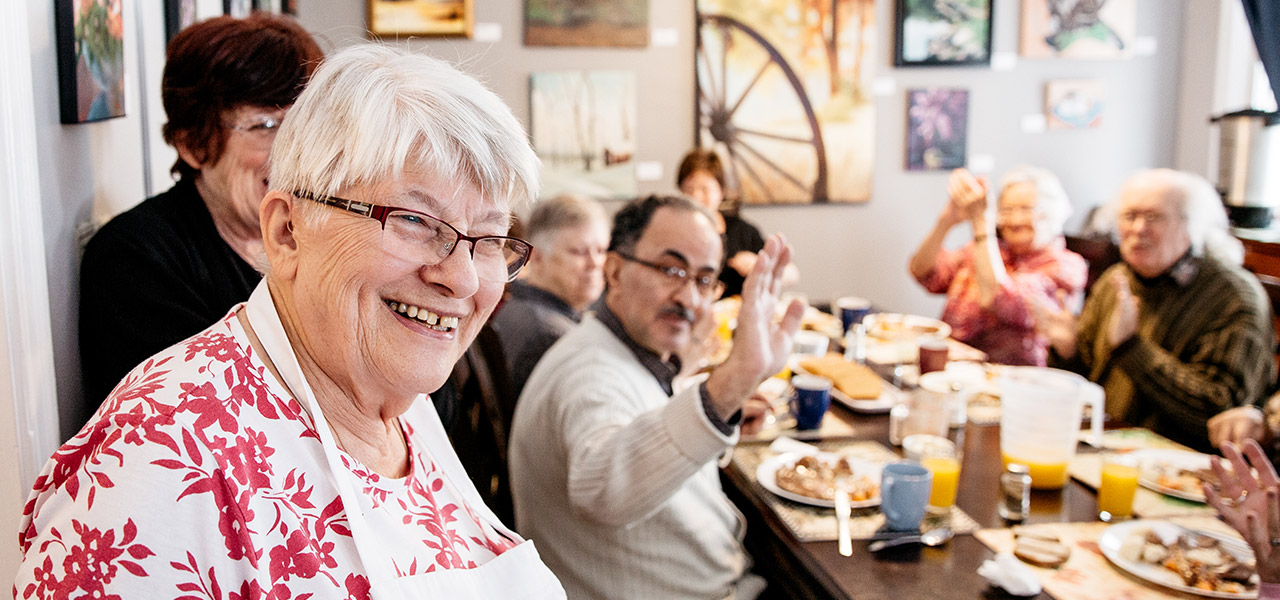
Sitting in the living room of a small, grey bungalow not far from Whyte Avenue, Cathy McLean sips her coffee and looks out at a quiet, tree-lined street. The room she sits in is inviting and warm, adorned with paintings of prairie landscapes and Edmonton’s lush river valley. As the Executive Director of the Senior Citizens Opportunity Neighbourhood Association, or SCONA for short, McLean has spent many days in this cozy refuge in the heart of Old Strathcona.
“I always say, I want this place to look like the Queen is coming, so we do lots of work to make sure it’s in good shape,” she laughs. “But what we really want is for people to embrace this place as their own. We want it to be comfortable and welcoming – like a second home – but also a lively hub. You should see how busy it gets in here sometimes!”
If SCONA’s walls could talk, they’d speak volumes about the community that passes through the building’s doors each year. The centre focusses on a special group of the population – “senior” seniors, with their members’ average age over eighty. Since 1975, the centre has hosted countless events, from weekly dinners to play recitals, computer lessons and holiday gatherings.
In her time as executive director, McLean has watched the organization grow from serving less than 200 members to now nearly 500. The growth, while welcome, has brought its own challenges for an organization with an extremely tight bottom line.
“When I started at SCONA, I said I wanted to see us get to 400 members. It was exciting, inching towards that each year,” says McLean. “But our growth has been speeding up. From January to October of 2018, we had more than 110 new members join. I’m still puzzling over how that happened – how did word suddenly get out? But it did. All I can do is clap my hands with excitement and buckle down to get back to work.”
The reasons behind SCONA’s rapid growth aren’t actually as mysterious as McLean lets on. In the past few years, the organization has developed partnerships with a number of other community groups around the city, like the Ritchie and Kenilworth Community Leagues and the Rutherford elementary school. These partnerships, coupled with Edmonton’s aging population, has led to an explosion of interest.
Many SCONA members live on fixed incomes and depend on the centre for social engagement as well as health and wellness supports. For them, it’s a community hub, where they can gather with friends and sign up for low- or no-cost services like hair cuts, massage therapy and recreation activities.
“Most of our members are women and many of them are part of a generation where they raised their families and were not encouraged to work outside of the home, so they have very little or no pension. So they’re living on miniscule amounts of money,” she says, adding that many members also face isolation after the death of a spouse. “We give them the opportunity to share who they are and what their experience has been so they can develop genuine, close friendships and social networks.”
SCONA’s growing popularity, while exciting, has brought its own challenges for McLean. As one of only two dedicated staff members at the organization, she has taken on extra duties as membership numbers have increased. Unfortunately, the government grants and resources previously accessed by SCONA have not kept up with demand for the organization’s services.
“We’ve really had some struggles the last couple of years,” she says with a pause. “We’ve come close to shutting our doors, at least temporarily, but how could we do that? So many people depend on us… we had to find a way to stay open.”
When McLean learned of SEF, she felt cautiously optimistic about SCONA’s future. The organization was in the process of applying for grants from the Province, but would need funds to cover costs in the meantime. Financing from SEF could bring hope, not just for McLean, but for the hundreds of seniors who had come to depend on SCONA’s services.
“I don’t hesitate to say that without SEF, we would be having a very different conversation today. I’m not sure we could’ve continued,” she says. “SEF helped us cover operating costs, our programming costs, basically everything we do.”
For instance, McLean notes that financing from SEF allowed SCONA to be creative in the ways it meets the needs of members.
“We know that many of our members are living alone, and we know it’s hard to cook for just one person. So when we have games, we try to offer prizes that make sense, so people can come and have fun but also maybe win something that’s useful to them,” she says. “All of our prizes are fruits and vegetables, so the winner can get something they normally couldn’t enjoy. SEF has helped us to do that.”
Although SCONA’s rapid growth brings other challenges (such as the need for a bigger dining room table at all those weekly dinners), McLean is confident in the organization’s future.
“2018 was a bit of a tough year for us, but through it we realized we are on the right path. We’re making a difference in people’s lives,” she says. “It’s going to take us some time, but ultimately we’re going to move forward. And that wouldn’t be possible without SEF.”
SVI Alberta is a conference held in Alberta where entrepreneurs, impact venture leaders, and changemakers gather to build their network and learn from each other through sharing experiences in a safe and supportive space.
Edmonton 3 October 2024 The Edmonton Community Foundation today announced the appointment of Ryan Young as the Director of the Social Enterprise Fund.
After thirteen years in the Executive Director chair at SEF, it is time for me to move on.